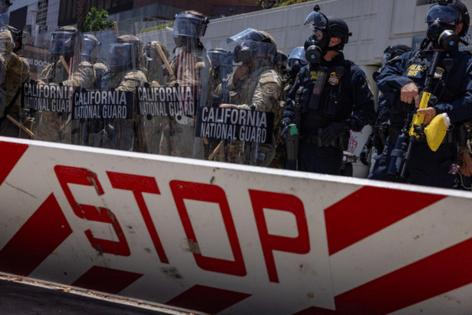Commentary: Federalizing the state National Guard is a chilling push past the law
Published in Op Eds
The use of the military to quell protests is something associated with dictators in foreign countries, and as of Saturday night, with a president of the United States.
When President Donald Trump federalized 2,000 members of the California National Guard, deploying them because of protests against federal immigration authorities, he sent a chilling signal about his willingness to use the military against demonstrators.
There are two relevant aspects of federal law: One allows the president to federalize a state’s National Guard and the other permits the president to use the military in domestic situations. Neither, at this point, provides legal authority for Saturday’s action.
As for the former, a federal statute, 10 U.S.C. section 12406, authorizes the president to take over a state’s National Guard if “the United States, or any of the Commonwealths or possessions, is invaded or is in danger of invasion by a foreign nation; there is a rebellion or danger of a rebellion against the authority of the Government of the United States; the President is unable with the regular forces to execute the laws of the United States.”
This is the statutory provision Trump has invoked. But it is highly questionable that the protests against ICE agents rise to the level of a “rebellion against the authority of the Government.”
This statute does not give the president the authority to use the troops. Another law, the Posse Comitatus Act, generally prohibits the military from being used within the United States. The 2,000 National Guard troops are only deployed to protect ICE officers. However, even this is legally questionable unless the president invokes the Insurrection Act of 1807, which creates a basis for using the military in domestic situations and an exception to the Posse Comitatus Act. On Sunday, Trump said he was considering invoking the Insurrection Act.
The Insurrection Act allows a president to deploy troops domestically in three situations. One is if a governor or state legislature asks for the deployment to put down an insurrection. The last time this occurred was in 1992, when California Gov. Pete Wilson asked President George H.W. Bush to use the National Guard to stop the riots that occurred after police officers were acquitted in the beating of Rodney King. With Gov. Gavin Newsom opposing the federalizing of the National Guard, this isn’t the case in Los Angeles today.
A second part of the Insurrection Act allows deployment in order to “enforce the laws” of the United States or to “suppress rebellion” whenever “unlawful obstructions, combinations, or assemblages, or rebellion” make it “impracticable” to enforce federal law by the “ordinary course of judicial proceedings.” Since no one disputes the courts are fully functioning, this provision has no relevance.
It is the third part of the Insurrection Act that is more likely to be cited by the Trump administration. It allows the president to use military troops in a state to suppress “any insurrection, domestic violence, unlawful combination, or conspiracy” that “so hinders the execution of the laws” that any portion of the state’s inhabitants are deprived of a constitutional right and state authorities are unable or unwilling to protect that right. President Eisenhower used this power to send federal troops to help desegregate the Little Rock, Ark., public schools when the governor defied federal court orders.
This section of the law has additional language: The president may deploy troops in a state that “opposes or obstructs the execution of the laws of the United States or impedes the course of justice under those laws.” This broad language is what I would expect Trump to invoke to use the troops directly against the anti-ICE protests.
The Insurrection Act does not define crucial terms such as “insurrection,” “rebellion” or “domestic violence.” In 1827, in Martin vs. Mott, the Supreme Court said that “the authority to decide whether (an exigency requiring the militia to be called out) has arisen belongs exclusively to the President, and ... his decision is conclusive upon all other persons.”
There have been many calls over the years to modify the expansive language of the Insurrection Act. But since presidents have rarely used it, and not in a very long time, reform efforts seemed unnecessary. The broad presidential authority under the Insurrection Act thus has remained on the books as a loaded weapon.
There is a strong set of norms that has restrained presidents from using federal troops in domestic situations, especially absent a request from a state governor. But Trump shows no respect for norms.
Any use of the military in domestic situations should be regarded as a last resort in the United States. The readiness of the administration to quickly invoke any aspect of this authority is frightening, a message about the willingness of a remade federal government to quell demonstrations.
The protests in Los Angeles do not rise to the conditions that warrant the federalization of the National Guard. This is not to deny that some of the anti-ICE protests have turned violent. However, they have been limited in size and there is no reason to believe that law enforcement could not control them absent military force.
But the statutes Trump can invoke give presidents broad powers. In the context of everything that we have seen from the Trump administration, nationalizing the California National Guard should make us even more afraid.
_____
Erwin Chemerinsky, dean of the UC Berkeley School of Law, is an Opinion Voices contributing writer.
_____
©2025 Los Angeles Times. Visit at latimes.com. Distributed by Tribune Content Agency, LLC.

























































Comments